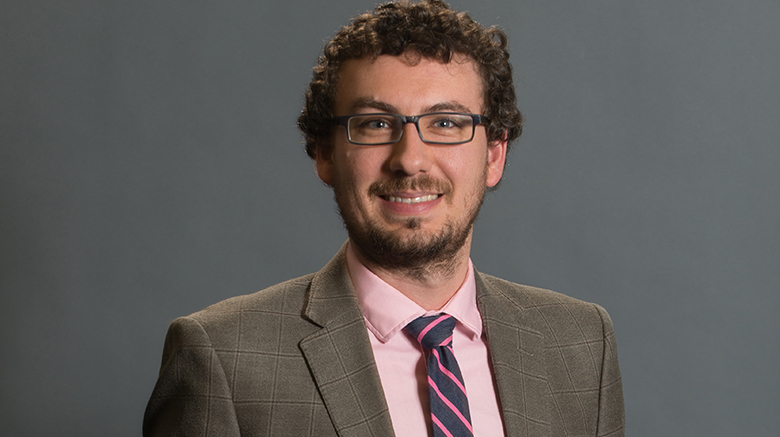When he was younger, Jesse Zarley, Ph.D., wanted to be to be a Tar Heel and play basketball at North Carolina in Chapel Hill. Just like Michael Jordan.
Now, Dr. Zarley teaches courses on Latin American, Caribbean and global history as an assistant professor at SJC Long Island.
And though he didn’t end up going to the University of North Carolina, Dr. Zarley did discover his passion for the subject of history while earning his bachelor’s degree.
“My second semester, I took a Modern Latin American history course and fell in love,” he said of his time at the University of Wisconsin-Madison, where he earned a B.A. in History and Latin America, Caribbean and Iberian Studies in 2008.
Delving into Research
Dr. Zarley’s interest in historical research stems from his time as an undergraduate, as well, when he studied abroad in Santiago, Chile, for two semesters and delved into archives. From there, his passion grew even further, and he figured out what parts of history truly fascinated him.
“I’m really interested in the history of indigenous peoples, slavery, empires, race and ethnicity, and what scholars call ‘transnational’ history—subjects that flow over or predate national borders,” Dr. Zarley explained. “In many ways, my research brought me to these interests.”
To this day, Dr. Zarley’s biggest area of research lies in the history of indigenous and Native American peoples in the southern-most areas of South America during the late-18th and early-19th century.
“In particular, I look at the Mapuche people who controlled much of Chile and western Argentina because they resisted conquest by the Inca empire in the 1400s, the Spanish in the 1500s, and Chile and Argentina until the 1880s,” he said.
“To research this topic, I’ve lived in and visited archives in Buenos Aires and Mendoza, Argentina; Santiago, Chile; and Seville, Spain,” Dr. Zarley added. “I’m currently turning this research into a book, which I hope to complete in the next year or two.”
He’s also published a portion of his dissertation, which focuses on two Mapuche leaders, in the journal “Ethnohistory.”
Dr. Zarley had the chance this past March to participate in a roundtable discussion with scholars from the United States and Chile entitled “Mapuche Politics from Independence to the Estallido Social Chileno.” It took place at the virtual Rocky Mountain Council for Latin American Studies annual conference.
Additionally, he will serve on the planning committee for the Latin America panels at the 2022 annual meeting of the American Historical Association, to be held next January in New Orleans.
Working in Academia
As far as how Dr. Zarley ended up working in academia, he said he “just missed school.”
“I missed research, reading, the conversation, debate,” he said.
After working at Georgetown University, Dr. Zarley decided to start applying to Ph.D. programs, and he ended up at the University of Maryland, where he graduated with a doctorate in history in 2017.
“I never looked back!” he said of his decision to stay in academia.
Originally from Wisconsin, Dr. Zarley’s enjoys teaching at SJC Long Island.
“I really love how interpreting the past is like putting together a puzzle with missing pieces, and that the pieces change depending on which sources you use and which questions and biases you bring to those sources,” said Dr. Zarley, who lives in Yaphank with his wife Katie, their toddler and their dog Camilla.
“As my students will tell you, I also clearly enjoy mixed and overwrought similes and metaphors,” he continued. “So, one of my favorite parts of teaching is introducing students to new puzzles, pieces, and working with them to put them together. This is also why I love historical research.”
In addition to teaching and researching, Dr. Zarley also spends his time as host for the Latin American Studies channel of the New Books Network.

